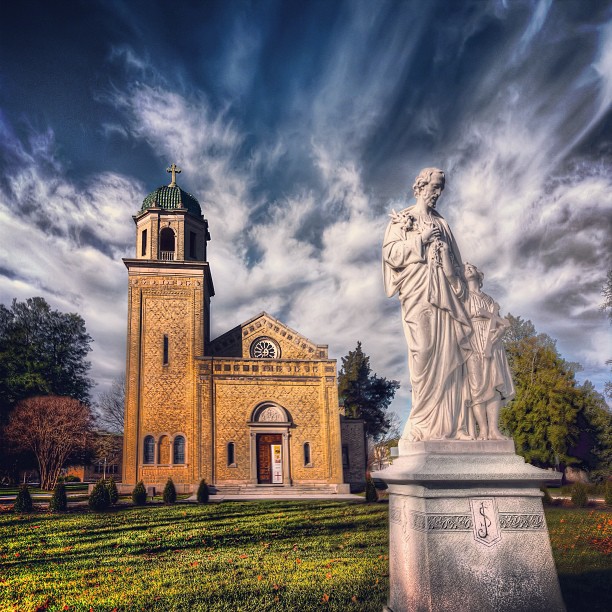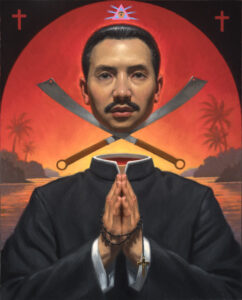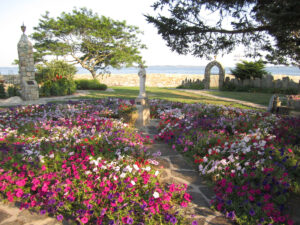CAT Editors: For what occasion was this new Mass of St. Joseph composed?
Frank La Rocca: The Missa Sancti Ioseph was commissioned for the Feast of St. Joseph the Worker, which is on May 1. Just prior to this Mass, the final step in establishing the order of the Contemplatives of St. Joseph (COSJ) will be achieved when Archbishop Cordileone consecrates Fr. Vito Perrone as Prior of the Contemplatives of St. Joseph after an 8-year period of formation. When this takes place, the first-ever newly created Holy Order in the Archdiocese of San Francisco will come into being. It’s a special day not only for the monks and priests of the Contemplatives of St. Joseph but for the whole San Francisco Archdiocese.
CAT Editors: What composers, if any, influence you and how? Did any composer specifically influence your composition for the Missa Sancti Ioseph?
Frank La Rocca: At this stage of my career, my influences are largely subliminal. That is, I am not consciously aware of any influences per se as I am working. What others have sometimes told me is that they hear the vocal texture of Renaissance polyphony with a harmonic language a bit like Bruckner. This is a sound, therefore, very much in continuity with the Church’s great treasury of sacred music, but in a harmonic language informed by more recent developments in harmony. Since this is music for Liturgy, it would not be appropriate to try to project any kind of highly individualistic voice in the music, such as one might do in a concert work. Seeking to assert a quality of ‘originality’ for its own sake could very well lead to music that would distract from the interior participation in the Liturgy that sacred music is supposed to facilitate.
This restraint, if you will, is not something all composers are willing to exert, but as Popes from Pius X to Benedict XVI have taught, such an approach conforms to the true “Spirit of the Liturgy” (the title of Benedict XVI’s excellent book, which I recommend to anyone interested in the questions surrounding music in the Liturgy).
CAT Editors: The Contemplatives of Saint Joseph requested using intonation for Mass VIII. How did this influence your composition of the Gloria? If it were from another Mass, would your composition be different? How?
Frank La Rocca: That intonation has a bright, uplifting character. Since this is the tone I already wished to establish for the Gloria, both because it is a joyous occasion and because we are in Easter Season liturgically, it was a good fit. In a different season and for a different occasion I may have considered something more restrained in character, in which case the specified intonation would, again, most likely be consonant in tone with the music I would compose: Such is the genius of those who bequeathed to us the music of the Graduale Romanum in adapting the chants to the liturgical seasons. In order for the intonation and the Gloria to mesh smoothly in actual performance, I specified that the intonation be sung in D major, which is the starting key for my Gloria.
CAT Editors: Is there a specific reason why you have the soprano starting the Kyrie and Agnus Dei, which is not very common in chant-based polyphony? What inspired you to start with the soprano and not the tenor?
Frank La Rocca: The reason is twofold: First, this is not a chant-based Mass. Second, and more importantly, these are the penitential movements of the Mass. The soprano voice, traditionally associated with a child’s voice in an all-male Schola, was (in the Bach Passions for example) often assigned the role of the ‘believer” or the ‘catechumen’. When we come before God to seek forgiveness, we should approach Him with a childlike receptivity (Matt 19:14). I seek to express that childlike disposition through the use of the soprano voice.
CAT Editors: Were there any special spiritual influences that went into the composition of this music?
Frank La Rocca: There are always spiritual influences in my music, as there are in many composers’ music, even when the subject is not explicitly religious. But more specifically, I sought in this Mass to capture a tone of humility, obedience, and reverence, since these are qualities embodied especially by St. Joseph in his role as the foster father of our Lord. Indeed, among the Saints, only the Virgin Mary can be said to have more deeply and perfectly embodied these traits. So this is for me a particularly “conservative” work, an approach I found entirely in keeping with the spirituality of St. Joseph.
CAT Editors: When and where can we come to hear and participate in this Mass for Saint Joseph?
Frank La Rocca: The Missa Sancti Ioseph will take place May 1, at 11 a.m., at Mater Dolorosa Church in South San Francisco.




